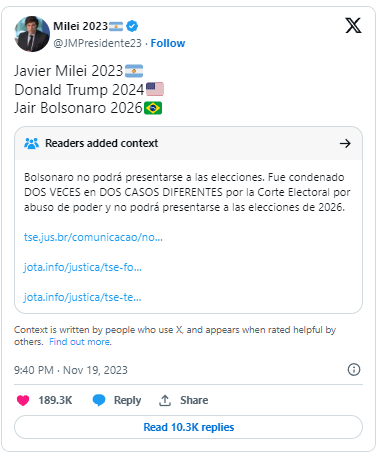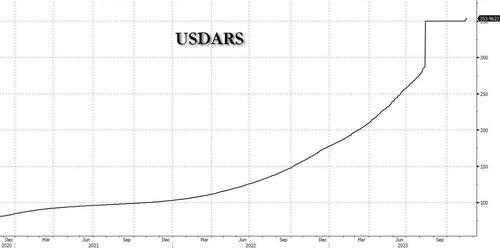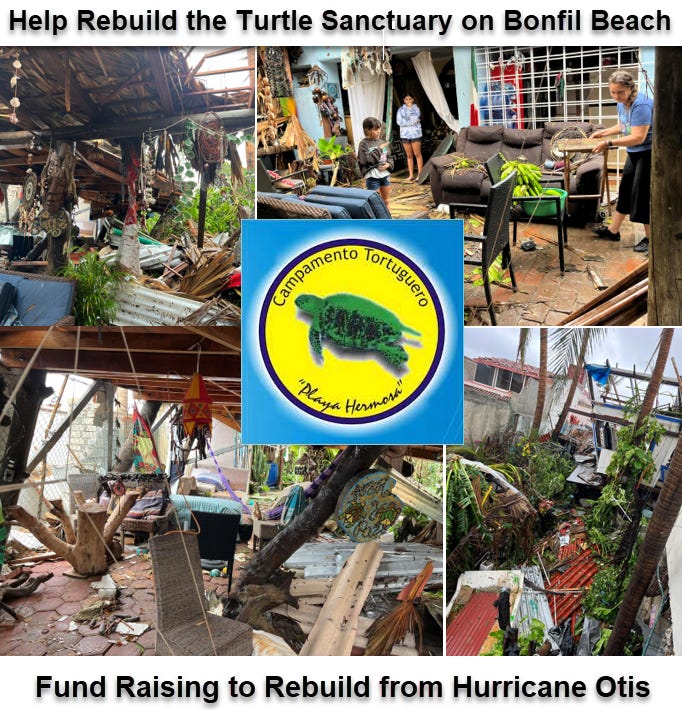Libertarian Javier Milei Is Argentina's Next President: What Happens Next
As reported last night, the outspoken libertarian candidate Javier Milei, also known as Argentina's Donald Trump and not to be confused with Brazil's Donald Trump, Jair Bolsonaro, both of whom, howeve
decisively won the second-round presidential election in Argentina, Latin America's third largest economy with 45 million people. With 99.3% of the votes counted, Milei obtained 55.7% of the valid votes, while incumbent Finance Minister Sergio Massa received 44.3%. Massa conceded the results of the election before the results were even released, and stated that “starting tomorrow” Mr. Milei “is responsible for providing certainty.” President Alberto Fernandez similarly acknowledged the election results. Later, it was reported that Massa could request a leave of absence from his position as Minister of Finance. Mr. Milei’s presidential term begins on December 10.
Milei campaigned against the political establishment and parts of the elite. Amusingly, even the staunch establishmentarians at Goldman Sachs admit that "his diagnosis of the country’s economic woes is accurate: the size of the government has grown too large, it spends more than it collects, and it uses the central bank to finance its shortfalls." In other words, just like the US.
As a result, fiscal profligacy is the root of the inflation problem (also just like in the US). In response, Milei has proposed an agenda of radical and transformative policies for the Argentine economy. Among his flagship economic proposals are closing the central bank, the dollarization of the economy, an aggressive cut to public spending, and the elimination of tight trade and capital controls.
In his victory speech, Milei did not deviate much from his libertarian campaign rhetoric and commented that “today begins the reconstruction of Argentina” and emphasized that “Argentina’s current situation is critical.” That said, Milei’s proposals carry significant implementation risk. For example, dollarization, which was absent from Milei’s speech tonight. That said, there is no free lunch and adopting, preserving, and benefiting from dollarization could be challenging.
In a thread on whether dollarization in Argentina is possible, former Treasury commentator Brad Setser had this to say:
Milei is the next President of Argentina -- Will be interesting: dollarization without any usable dollars at the central bank is a technical challenge (to put it mildly
Not sure tho that dollarization leads to the risk of hyperinflation (as Bloomberg suggests) -- "dollarizing the $622 billion economy at a time when international reserves are depleted could tip the South American nation into another bout of hyperinflation"
the immediate risk of course is that the peso depreciates sharply (technically, Argentina can only dollarize at a very depreciated peso).
But the subsequent risk is less hyperinflation and more generalized default ...
Dollarization -- if done for real -- implies that all domestic liabilities are redenominated into dollars. And it isn't at all clear how a government with no dollars would be able to honor its domestic dollar liabilities.
It is completely unclear how Milei will implement his plans -- the BCRA's remaining dollars are pledged to back the banks required reserves, and China may well want its CNY back. The IMF isn't keen on lending Argentina more. The core constraints won't go away.
But it will be a test of many different theories about the stabilizing (or destabilizing) impact of abandoning one's currency, and with it, an important amount of sovereignty
In a similar note overnight, Bloomberg columnist John Authers reminds us of the "money quote” from Milei's interview with Bloomberg back in August: "Central banks are divided in four categories: the bad ones, like the Federal Reserve, the very bad ones, like the ones in Latin America, the horribly bad ones, and the Central Bank of Argentina" and writes:
A self-described anarcho-capitalist who wants to abolish the central bank and do away with the country’s currency, he represents change and an ambition to make things better. He’s now been given that opportunity fair and square, and a fascinating experiment awaits. He recognizes the task ahead. “Argentina is in critical condition,” Milei said in his victory speech, adding that “there’s no room for gradual measures.” If that sounds as though he’s preparing to throw all caution to the winds, it’s encouraging that he also behaved more like a normal politician by thanking the center-right conservative politicians who had decided after much angst to endorse him rather than accept another term of Peronism
For his part, Authers remains skeptical: "Anarcho-capitalism, like the communism espoused by another Argentine idealist, Che Guevara, sounds really great. It’s hard to imagine it working so much better than Cuban-model communism. The devaluation that lies ahead, and the kind of austerity that will accompany it, is a lot to ask of anyone. Beyond that, effectively letting a foreign central bank run your economy didn’t work terribly well for Greece, and doesn’t sound like a friendly environment for anarcho-capitalism — although at least on Milei’s analysis, the Fed is better than the Central Bank of Argentina."
In any case, it is indisputable that a swift change from the failed economic policies of the past is imperative. The accumulated imbalances in the economy have grown too large and must be addressed promptly. Looking ahead, Goldman expects the economy to contract for the second year in a row in 2024 with annual inflation tracking at close to 150% and is expected to continue to rise in the coming months, the exchange rate is significantly overvalued, international reserves are at critical levels, net reserves are significantly negative (around -US$11bn on our estimates), the wide fiscal imbalances persist, sovereign bonds trade at distressed levels, the government lacks access to international financial markets, and the EFF program with the International Monetary Fund is off track.
In short, the country's economic devastation is why Milei won. Now he has to fix it.
Can he do it? According to GS economists, a tangible and structural fiscal adjustment (e.g., moving to a sustainable primary surplus), a responsible independent central bank free from the grip of fiscal dominance, financial liberalization, and structural reforms to make the economy more open, productive, and flexible, are needed to put the economy on a sustainable path. Of note, economic subsidies in energy and transportation account for a significant part of the deficit, close to 2.5% of GDP, and are natural candidates for cutting spending. During the campaign, however, Finance Minister Massa implemented a series of populist measures that have the potential of negatively impacting the fiscal accounts.
Milei will have to work without a majority in congress. After the first-round election, part of the center-right Juntos por el Cambio coalition, the faction led by presidential candidate Patricia Bullrich and former President Mauricio Macri, announced their support for Milei. The bloc represented by the Radical Party, however, decided not to formally endorse any of the candidates. How they position themselves after Milei’s victory will be noteworthy.
Investors will now turn their attention to economic policy announcements by Milei and the current government. In the short term, the highly managed exchange rate will be a critical variable to follow. After the August primary elections, the government weakened the exchange rate by about 22% to 350 ARS per Dollar. Subsequently, the exchange rate was kept frozen at this level until a slow crawl resumed on November 15 (1.0% depreciation in the week).
Nevertheless, pass-through was high and inflation accelerated considerably after the post-PASO devaluation and as a result, the real exchange rate is now even more overvalued than before the August devaluation. The spread between parallel exchange rates and the official exchange rate remains wide. The dynamics of peso term deposits will also be closely watched, as a rapid withdrawal of funds could have important implications for financial stability.
With reserves at critical levels, the Argentine government faces important external payments to the IMF and hard currency bond holders in the coming months (December-January). Realigning the IMF program will likely take time, but we note that the next program review is scheduled for later this month.
Lastly, cabinet appointments by Milei, in particular the important Minister of Finance and key positions in the central bank will be key to watch. We note that Monday, November 20, is an official holiday in Argentina.
In conclusion, the question is now that he has the public's mandate to do the painful things, will the public be just as willing to go with the consequences? As Bloomberg's Authers notes, "the risks for the immediate future can be devolved into the very tricky decisions that lie ahead for how Milei is going to try to put his plans into effect. It certainly can’t all be done on “day one,” as presidential candidates are fond of saying. And much also rests on the shoulders of the man himself. Markets don’t know him well, and a lot of what they do know makes him sound like a character whose judgment can’t be trusted. That will amp still further the need for his each move to be calculated. If not “Mission Impossible,” it’s “Mission Mighty Difficult.”
But the bottom line is that Milei has received an endorsement from the Argentine people, who at this point know what they’re getting into (or maybe they don't but they are about to find out very quick). "Massa would have represented more of the same policies that have been an abject failure. Rather than act like First World War generals and do the same thing again and again in the hope that it will work next time, they’re taking a big risk and more or less guaranteeing themselves even more pain in the short term, to see if they can turn it around."
Some more background on Milei (courtesy of WuBlockhain)
Javier Milei was born in 1972 in Palermo, Buenos Aires. His mother was a homemaker and his father was a bus driver before becoming a businessman in the public transport sector. He had a strained relationship with his parents, stating that they abused and verbally insulted him, leading to at least a decade of no contact with them, effectively cutting ties and considering them dead. During his 2021 campaign for the Chamber of Deputies, he chose to reconcile with his parents.
Before 1989, Milei was a goalkeeper for the youth team of Club Atlético Vélez Sarsfield. However, due to hyperinflation during the tenure of Economy Minister José Os as in Argentina, he decided at the age of 18 to stop pursuing football and instead studied economics, aiming to make a living from it. He earned a Bachelor’s degree in Economics from Universidad de Belgrano and two Master’s degrees from Instituto de Desarrollo Económico y Social and Universidad Torcuato di Tella.
He served as the chief economist at Máxima AFJP, a private pension company, and at Estudio Broda, a financial consulting firm, as well as a government advisor at the International Centre for Settlement of Investment Disputes. He was also a senior economist at HSBC Bank Argentina. He has been the chief economist for various national and international public institutions. Since 2012, Milei has led the economic research department of the national think tank Fundación Acordar. He is also a member of B20, the International Chamber of Commerce’s Economic Policy Group (an advisor to the G20), and the World Economic Forum. Additionally, he has been a university professor for over twenty years, teaching courses in macroeconomics, economic growth, microeconomics, and mathematics for economists.
In 2020, Milei joined the Progressive Freedom Party (Avanza Libertad) and ran for the Argentine Chamber of Deputies in 2021, promising not to support any tax increases or new taxes, and also established the Liberty Advances Party. He frequently promoted himself on television, radio, and YouTube, gaining support from many young people. During his time as a deputy, Milei held monthly raffles, giving his entire parliamentary salary to the winners, open to anyone.
In 2023, Milei ran for president, proposing to allow people to freely buy firearms and human organs, promising to repeal the Voluntary Termination of Pregnancy Act, and advocating for the criminal punishment of abortion. In the August 2023 presidential primaries, Milei received 30% of the votes, becoming the first far-right candidate to win a primary since Argentina’s elections began in 1916. In the second round of voting held on November 19, Milei defeated his opponents and was elected the new president of Argentina.
Main Viewpoints
In economic issues, Milei is a staunch supporter of the Austrian School, once stating, “Beasts who support Keynesian economics are everywhere.” He considers Argentina a tax hell and advocates for rapid cuts in government spending to balance the budget. He frequently appears on television criticizing the excessive spending and financial mismanagement of Mauricio Macri’s government, the former president of Argentina. He advocates for the abolition of the Central Bank of Argentina, monetary substitution (allowing the use of the US dollar within Argentina), a return to the gold standard, and metallism.
However, his use of mathematical formulas and charts in his works to explain his views has also been criticized by Austrian School economists (who view economics as a social science), claiming his concepts are confused and his formulas incorrect. In April 2023, economist Constantino Hevia from Universidad Torcuato di Tella stated: “If you analyze it a bit, you realize that the public greatly overestimates Milei’s understanding of economics… Milei always shouts concepts he doesn’t understand himself, misleading the public who follow him. In fact, there are many concepts Milei doesn’t understand at all, as you can tell from his notes.” He concluded: “Milei’s lack of mathematical skills, coupled with his enormous arrogance, often leads to numerous mistakes in his statements.”
Politically, Milei is seen as far-right, right-wing populist, extremely conservative, and right-wing libertarian, though he considers himself a minarchist or classical liberal, advocating for anarcho-capitalism. In foreign policy, he is close to the United States and Israel, advocating for a struggle against socialistsand centralists, refusing to do business with socialists.
Milei is a supporter of Bitcoin, stating that it returns funds to their original creators and serves as a tool against government control and central bank policies. He openly supports the use of cryptocurrencies as a means for ordinary Argentinians to escape from the inflation of the peso. He also praises the limited supply of Bitcoin, considering it a safer alternative to gold or silver. (Note: Argentina’s cumulative inflation rate from January to September 2023 was 103.2%, with the past 12 months reaching 138.3%, and the full-year cumulative inflation rate for 2022 was 94.8%).
Nevertheless, his policy focus as president is not closely related to cryptocurrencies, focusing more on the complete liberalization of central banking, finance, foreign affairs, and other sectors. Considering Milei’s economic liberalism, it is unlikely that he would use state power to intervene in and promote the adoption of cryptocurrencies after becoming president.
Campamento Tortuguero Playa Hermosa is a turtle sanctuary on Bonfil Beach outside of Acapulco that rescues sea turtle eggs that would be likely destroyed by vehicles on the beaches or pilfered by tourists. The sanctuary protects the eggs, hatches them and releases the babies into the ocean while protecting them from seagulls and other winged predators.
The 35-year-old sanctuary is run by the mother/daughter duo of Monica and Michel Vallarino, who have helped educate the community and the tourists on the ecology of the turtles while simultaneously providing a refuge for puppies, kittens, ducks, rabbits, and other wayward animals.
The Art of Liberty Foundation hosted an annual fundraiser from 2018-2020 called the Art of Liberty on the Beach (aKa The Turtle Party), where many of the leading artists in the liberty movement have rocked the sanctuary including Grant "Prezence" Ellman, Truniversal/Free Willow, Alais Clay, the Freenauts, DJ Koala, DJ Ramiro Romani and ELA-mental among others.
The sanctuary was devasted by Hurricane Otis, a category five hurricane that hit Acapulco and Bonfil Beach on November 2nd 2023.
25% of Funds Raised Will Benefit Other Residents of Bonfil Beach
The Art of Liberty Foundation is organizing a fundraiser where 100% of the proceeds will go to direct relief. The Vallarinos have agreed to share 25% of the proceeds with other Bonfil Beach residents in need to be distributed at their discretion.









